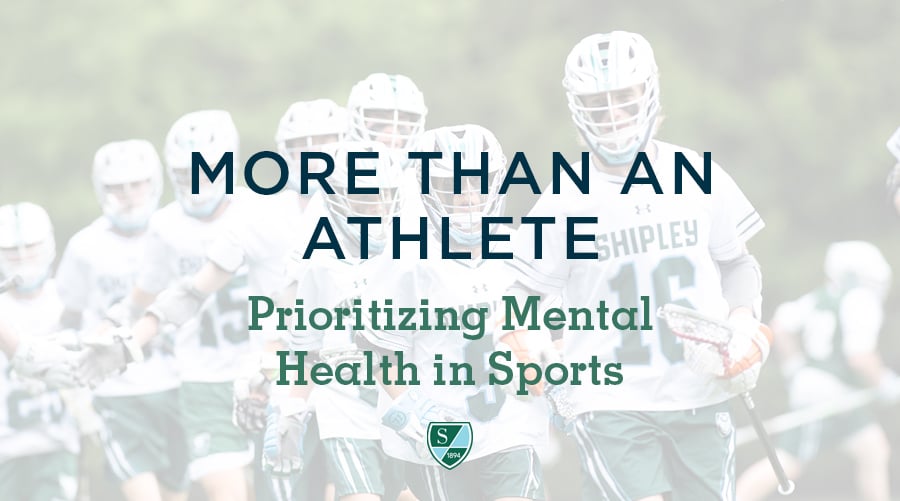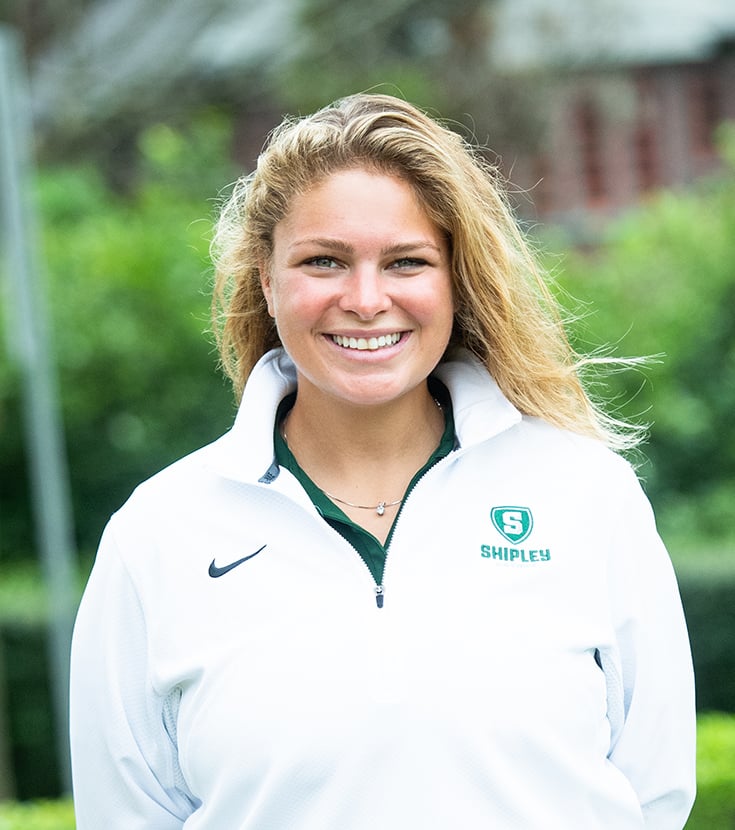Most of us are familiar with the positive mental and physical benefits of playing sports: regular exercise, strong social bonds with teammates, and a way to relieve stress and anxiety. Being an athlete builds positive character strengths and develops leadership skills that translate to other areas of life. Even though sports can be a gateway to student-athletes’ happiness and well-being, when athletes face an injury that sidelines them from the competition, their emotional and social well-being and sense of identity may be negatively impacted. The stress, pressure, and high expectations that athletes face daily can be draining. As coaches, role models, and leaders, we need to advocate for our student-athletes and make mental health a priority in athletics.
Like many student-athletes, I always felt most comfortable on the field or on the court. Balancing the high academic standards at Shipley was a challenge, but soccer and basketball were there as an outlet for me. Participating in sports through high school and college helped me develop leadership skills, build confidence, and make life-long friends. Being an athlete was a significant part of my identity.
In 2019, while playing in a basketball game, I suffered a severe knee injury that forced me to spend two months in a wheelchair. In order to recover, I had to quit my job, and for the first time, I had to navigate new challenges and stress in life without sports. As many athletes do when they step away from their sport, I faced serious mental health struggles while learning to adjust to my new reality. With the support of my mentors, family, friends, and past coaches, I was able to find new passions and see myself as more than just an athlete.
Some student-athletes leave their sports for reasons besides an injury. By the time students reach high school, they are trying to balance playing sports with academics, other extracurricular activities, and spending time with friends and family. The pressure to excel academically can come into direct conflict with the pressure to be a leader on the field or score the winning goal for the team. Attempting to attain perfection or greatness in all areas can leave students mentally and physically exhausted, with little love or enthusiasm for the things that once brought joy.
Excessive performance pressures on student-athletes are another source of mental health challenges. According to The American College of Sports Medicine, 30% of women and 25% of men who are student-athletes reported experiencing anxiety; however, only 10% of college athletes with diagnosed mental health conditions seek help from a mental health professionals (2021). Even professional athletes have joined in the public conversation around mental health to share how the pressures of their jobs have affected them both personally and professionally. As Naomi Osaka wrote after taking a break from professional tennis, “I do hope that people can relate and understand it’s O.K. to not be O.K., and it’s O.K. to talk about it. There are people who can help, and there’s usually light at the end of any tunnel (Osaka, 2021).”
Student-athletes deserve coaches’ attention beyond the court and field. There is a stigma around mental health that may make students think that asking for help is a sign of weakness. As leaders, we need to continue to support athletes and emphasize that asking for help is essential and normal. My coaching philosophy integrates Shipley’s educating to flourish principles into athletics and to care for our athletes beyond their talents in sports. Investing in young student athletes’ physical and mental growth is crucial for their success.
In Shipley’s Athletics Department, coaches focus on building a team culture that prioritizes a healthy mindset; this means encouraging players to seek out support when needed, building life skills that translate to other areas of their careers, and ensuring that each individual feels included and supported. Shipley recently partnered with Greenpsych, who presented to our Athletics Committee (a group of student-athletes who promote and represent the athletic programs within our student government), to discuss strategies to cope with the pressures and stress of being a student-athlete. Beginning conversations about the importance of caring for your whole self—mentally and physically—as early as possible, helps prepare our students for the increasing demands of their athletic careers and provides them with the necessary tools and characteristics to flourish throughout their professional careers with or without sports.
References and Additional Resources:
- Shipley’s Upper School Counselor:
Kira White - Local mental health professionals who specialize in working with athletes and former athletes:
Greenepsych
Crossover Counseling
Sean Cleary
Dr. Shadana Davis
Katie Ryan - Film
The Weight of Gold (2020), streaming on HBOMax - ESPN Mental Health Awareness
- Cleveland Clinic. (2021, August 9). Athletes and Mental Health: Breaking the stigma. Cleveland Clinic. https://health.clevelandclinic.org/mental-health-in-athletes/
- Osaka, N. (2021, July 8). Naomi Osaka: 'it's O.K. not to be O.K.'. Time.
https://time.com/6077128/naomi-osaka-essay-tokyo-olympics/ - The American College of Sports Medicine Statement on Mental Health Challenges for Athletes. ACSM. (2021, August).
https://www.acsm.org/news-detail/2021/08/09/the-american-college-of-sports-medicine-statement-on-mental-health-challenges-for-athletes#:~:text=Professional%20and%20elite%20athletes%20also,%2C%20depression%20and%2For%20anxiety










